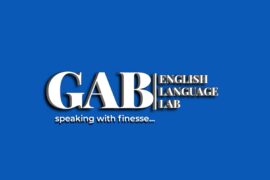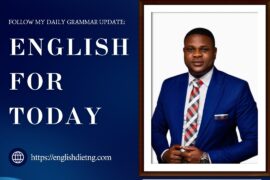On the Inclusion of Nigerian English Words in the Oxford English Dictionary: Implication for Standard English
Ganiu Bamgbose, PhD.
The Guardian Newspaper of 21 January, 2020, reported the inclusion of about 25 words of Nigerian English origin in the Oxford English Dictionary. This development has been greeted with joy by many Nigerians for two major reasons. First, the inclusion has, in one way or the other, boosted the image of the country as one of the fast-growing countries where the English language serves as a second language in the world. Second, it serves as a booster for those who consider the activities of some language revivalists/instructors as being over the board. So some persons are happily saying, “Now, that our words are found in the dictionary, let’s hope we are allowed to use the language as we want.” This piece hopes to shed light on the controversy surrounding the use of the English language in Nigeria, in terms of acceptance and otherwise.
First off, the English language, in its characteristic flirtatious nature, has borrowed from over twenty world languages to enrich its vocabulary. This is responsible for why the language has remained the most geographically dispersed language in the world. Before the inclusion of the new words, which comprise: next tomorrow, k-leg, chop chop, okada, ember month, other words such as agbada, dashiki and fufu had been added to the English language from Nigerian languages. However, this open-ended approach to vocabulary development does not nullify the relevance of addressing the need to still use the language and the newly birthed “legitimate” words courteously.
Undoubtedly, the Nigerian English is the only variety of English available to a Nigerian in Nigeria. This is because it has been made to colour our existence and to reflect our realities. This is one of the reasons why the use of expressions such as “correct,” “incorrect,” “right” and “wrong” are discouraged in modern grammar. A person cannot be said to be wrong, provided his or her expression fulfils its communicative purpose. Notwithstanding, expressions such as “standard,” “nonstandard,” “appropriate,” “inappropriate,” “slangy” and “colloquial” are usually deployed to apply caution to language use. This implies that the issue with an expression might not be one of correctness or incorrectness. As such, this is equally the reason why my daily lessons on the use of English language among second language users is presented in terms of standard and nonstandard usages.
Scholars of English have identified three categories of language users known as acrolectal, mesolectal and basilectal users. Acrolect is the language of those who possess a mastery of the language and can communicate intelligibly with users of the language across the globe. The speakers of English in this category are always in the minority. This is because, usually, this stage is reached through a great deal of effort on the part of the language users. Mesolect is the variety of those who can be described as average users of the language. This category of users has a better command of the language than those who are in the basilectal class. Basilect describes the class of users who struggle to express themselves clearly in the language. It is the class of those described by Nigerians as “Idea is needed.” Other scholars, such as Fakoya (2008), have also identified other classes such as hyperlect. Hyperlect is the variety used by the noble class, which often comes with sophistication. The hyperlectal variety considers issues beyond grammaticality. In line with this, one can safely say that the business of using language goes beyond saying a word is found in the dictionary. The word, parlour, for instance, is described as informal in dictionaries. Therefore, to give preference to the word, sitting room, in one’s formal writing might not be an issue of (in)correctness but, of course, an issue of standard or appropriate usage. The inclusion of the Nigerian English word, chop chop, in the dictionary, for instance, may not be an indication that it will make a good substitution for the word glutton in some kinds of writing or speech, except one means to poke fun. This piece is, therefore, an attempt to make clear the fact that language use involves aesthetic issues that go beyond the inclusion or presence of certain words in the dictionary. Nigeria, as the biggest and most populous black African race, will continue to indiginise, nativise and adapt the English language to reflect our worldviews. I, too, have established the need to grow the vocabulary of Nigerian English through our popular cultures, especially the Nigerian hip-hop (see, Bamgbose, 2019). Notwithstanding, language users must understand that there are variables that guide the use of language in different contexts, which make the activities of language instructors inevitable, even to a person who says to her/himself, “Shebi the word is in the dictionary?”
© 2020 Ganiu Abisoye Bamgbose (Dr GAB)
References
Bamgbose, G.A. (2019) Beyond Rhythm and Lyrics: Pragmatic Strategies of Humour in Nigerian Hip-hop. European Journal of Humour. Vol. 7 (4). 16-31.
Fakoya, A. (2004). A Mediolect Called “Nigerian English. In Owolabi, K. and Dasylva A., eds. Forms and Functions of English and Indigenous Languages in Nigeria: A Festschrift in Honour of Ayo Banjo. Ibadan: Group
Publishers.

